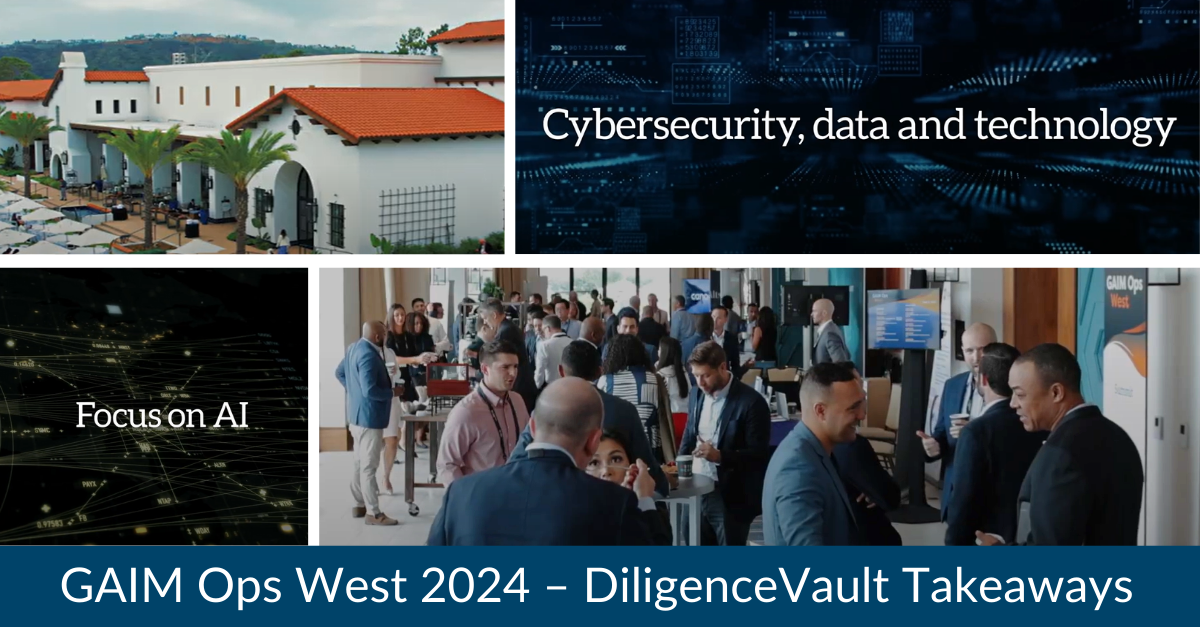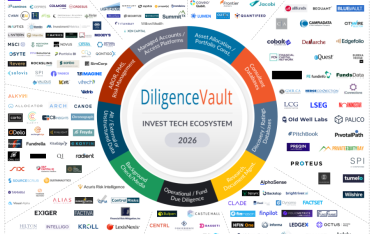Fresh from attending the GAIM Ops conference in southern California, the DiligenceVault team had a fantastic opportunity to connect with current clients and industry peers. This was our 5th year attending, and the event offered valuable perspectives on operational diligence, regulatory, and compliance challenges. In this Q&A, we’ll dive into key observations from the conference and discuss how today’s evolving landscape is reshaping priorities for diligence and compliance teams.
From Team DiligenceVault, our Founder and CEO, Monel Amin, and Sales Executive Dan Sullivan bring you key takeaways and insights from the event.
Dan: The first day was packed with interesting sessions that were pretty wide-ranging. Everything from scalable operating models to VC fraud to cybercrime. Which session stood out to you the most?
Monel: The focus of several discussions was on principles of risk management, with a focus on identifying risks (VC fraud case study) as well as end-party risk management. The panelist shared a story of a VC manager where there are specific risk signals (over leverage, high expenses, lack of cash controls at the management company level, etc.) that would have been early indicators of fraud.
On the topic of end-party risk management (AKA service provider diligence, 3rd and 4th party diligence, know your provider), it is certainly becoming quite common across our client base, some driven by heightened data privacy and security risks, while often it’s a function of regulatory requirements. The panel reflected on having a framework to build a baseline and then developing a risk-based framework to address key areas.
Monel: How about you, Dan?
Dan: I think the most unique panel included an FBI field agent who came by and shared stories of recent cybercrimes in the industry. But besides that, I would say the most interesting topic was third-party risk monitoring. This comes up in my conversations with clients and prospects regularly, and the sessions helped reinforce why it’s meaningful to asset managers and allocators. It may sound overwhelming at first to build out the program for TPM, but with software like ours, you can be set up pretty quickly and one step ahead of the game.
Dan: Beyond the topics covered in each panel, did any themes stand out amongst your conversations at the event?
Monel: There’s something called AI. Across panels and with client discussions and general interaction with attendees, there are two camps: the ones that are watching the risks develop and the ones that are keen to adopt Gen AI. The expectations from Gen AI technology are quite expansive, ranging from summarizing complex legal documents, extracting information from DDQ packets, to identifying key risk areas. While there are a multitude of possibilities, there are also views that the essence of due diligence is in identifying outliers and connecting the dots that are beyond the expected. While AI is great at interpolating, it may not be great at extrapolating. Or it may miss the edge cases when summarizing a complex document. So the effective use of AI would be a function of how and where the due diligence teams leverage it. Which use cases are ideal for summarization vs. extraction vs. automation.
Monel: Would you say that’s fair? Did anything stand out to you?
Dan: I feel like one theme, which isn’t necessarily new, was resource management. Investment Ops are being asked to do more with less (or, do more with the same amount of headcount and budget). It was interesting to listen to panelists discuss how they’re handling all of this – be it partnerships with technology vendors, increased staff training, or straight outsourcing. I’m impressed at how the investment office continues to evolve and adapt, especially in a landscape that’s changing rapidly with technology.
Dan: There were quite a few discussions on the panel and in one-on-one discussions around the power of technology to achieve operational excellence. What have been your takeaways?
Monel: Another panel discussion that was quite interesting was views on technology across a $1tn+ asset manager, a $25bn alternative investment firm, and a startup private markets fund, and how each of them approaches tech adoption decisions. While tech is top of mind for each panelist, the larger the firm, the technology adoption decisions get more challenging, with the reality being a tapestry of tech solutions that may not be very well integrated. On the other hand, the startup firm can get an all-in-one solution and can start with a modern tech stack immediately. The panel reinforced the thought for me that there is a tremendous potential for technology to bring efficiency to our industry, and it’s important that as technology firms we make it easy for our clients to modernize technology and create an integrated technology stack.
Closing Views: DiligenceVault has been attending GAIM Ops West and GAIM Ops Cayman for a few years. It’s a great opportunity to learn about industry trends for our product and sales teams. It’s invaluable to meet with a growing number of clients who are at these conferences, including over 10 client firms last week. To learn more about DiligenceVault, how we work with the industry participants in streamlining due diligence frameworks across ODD, ESG, manager research, and what is AI at DV, check out www.diligencevault.com.



